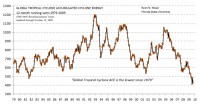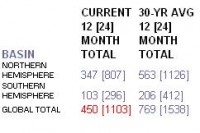By Ryan Maue
With the Northern Hemisphere Tropical Cyclone (TC) seasons winding down in the Eastern Pacific and North Atlantic, it is as good as time as any to take account of what the Earth has offered during the past 12-months in terms of TC Accumulated Cyclone Energy (ACE). Since the last Southern Hemisphere season was quite uneventful with well-below normal ACE, and the continued Northern Hemisphere inactivity, the sum of the two = global ACE has fallen off the table.

The global ACE index enlarged here.
The current ACE represents the tropical cyclone activity from January 1, 2009 until the date indicated. This is readily compared to the YEARLY value which is the previous 30-year average from Jan 1 - Dec 31 or the calendar year. The values through October 31 and November 30 represent the previous 30-year average as well with the average October ACE indicated in the last cell. There is considerable year-to-year variability across the basins, of which understanding motivates the updating and maintenance of this site.

Table enlarged here.
Comparisons through October 12
What is the current state of tropical cyclone activity compared to the same date during the past 30-years? This comparison table highlights the GLOBAL, SOUTHERN HEMISPHERE, and NORTHERN HEMISPHERE totals for the previous 12 and 24-months, respectively.

Table enlarged here.
Note: The Accumulated Cyclone Energy metric combines frequency, duration, and the intensity of tropical cyclones into one value that can be calculated from historical storm records as well as current operational center (i.e. NHC) advisories. The ACE is simply the wind speed squared (times 10^4 kts^2) for each 6-hour storm location and intensity estimate—added up for an entire season or whatever period you wish to define. CLIMO based upon 1979-2008 climatology See Ryan’s tropical page here. Al Gore please note.
Also Kevin Trenberth please note. Looks like it is YOUR AMS posting that was shameful (see Roger Pielke Jr.’s post here). You and the AMS owe Roger Pielke Jr and Chris Landsea apologies for your bloviation proven to be as wrong as the IPCC forecasts.




